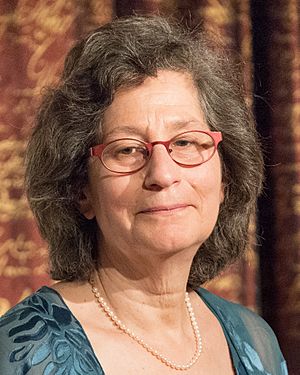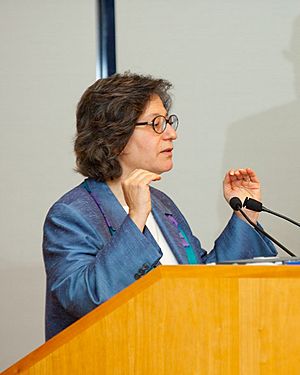Susan Solomon facts for kids
Quick facts for kids
Susan Solomon
|
|
|---|---|

Solomon in 2018
|
|
| Born | 1956 Chicago, Illinois, U.S.
|
| Education | |
| Known for | Ozone Studies |
| Awards | National Medal of Science (1999) V. M. Goldschmidt Award (2006) William Bowie Medal (2007) Volvo Environment Prize (2009) Vetlesen Prize (2012) BBVA Foundation Frontiers of Knowledge Award (2012) Crafoord Prize (2018) |
| Scientific career | |
| Fields | Atmospheric chemistry |
| Institutions | Massachusetts Institute of Technology |
Susan Solomon (born 1956) is an American scientist. She studies the chemistry of Earth's atmosphere. For many years, she worked for the National Oceanic and Atmospheric Administration (NOAA). In 2011, Dr. Solomon became a professor at the Massachusetts Institute of Technology (MIT).
Dr. Solomon and her team were the first to explain the cause of the ozone hole over Antarctica. They showed how certain chemicals, called chlorofluorocarbons (CFCs), were destroying the ozone layer. Her work helped lead to a global agreement to stop using these harmful chemicals. She is a member of several important science academies around the world. In 2008, Time magazine named her one of the 100 most influential people.
Contents
About Susan Solomon
Her Early Life and Education
Susan Solomon was born in Chicago, Illinois, in 1956. She became interested in science as a child. She loved watching TV shows about the ocean, like The Undersea World of Jacques Cousteau. In high school, she even won third place in a national science contest. Her project measured how much oxygen was in a gas mixture.
She went to the Illinois Institute of Technology. There, she earned a bachelor's degree in chemistry in 1977. Later, she studied at the University of California, Berkeley. She received her master's degree in chemistry in 1979. In 1981, she earned her Ph.D. in atmospheric chemistry.
Her Work and Research
Before joining MIT, Dr. Solomon led a group at NOAA. This group studied chemistry and climate processes. Her research has focused on understanding our atmosphere.
Understanding the Ozone Hole
One of Dr. Solomon's most important discoveries was about the Antarctic ozone hole. She and her team at NOAA figured out how it was forming. They found that CFCs were reacting on the surface of tiny ice particles. These reactions happened in the high-altitude clouds over Antarctica. This process was quickly destroying the ozone layer.
In 1986 and 1987, Dr. Solomon led an expedition to Antarctica. Her team gathered proof to confirm their ideas. They measured very high levels of chlorine oxide in the atmosphere. This chemical is released when CFCs break down from ultraviolet radiation. Dr. Solomon was the only woman leading this expedition.
She also showed that volcanoes could make the damage worse. Her work was key to the Montreal Protocol. This is an international agreement to protect the ozone layer. It helps by controlling harmful chemicals. Dr. Solomon's research has shown that this agreement is helping the ozone layer heal.
Books She Has Written
Dr. Solomon has written several books.
- The Coldest March: Scott's Fatal Antarctic Expedition (2002) tells the story of Captain Robert Falcon Scott's trip to Antarctica in 1912. Dr. Solomon used modern weather data to understand why Scott's team faced such difficulties.
- Aeronomy of the Middle Atmosphere: Chemistry and Physics of the Stratosphere and Mesosphere (2005) explains the chemistry and physics of Earth's middle atmosphere. This part of the atmosphere is between 10 and 100 kilometers high.
Work with the IPCC
Dr. Solomon was also part of the Intergovernmental Panel on Climate Change (IPCC). This group studies climate change and provides information to governments. She helped write important reports for the IPCC. She was also a co-leader for one of their major reports.
Awards and Honors
Susan Solomon has received many awards for her scientific work.
- In 1994, two places in Antarctica were named after her: Solomon Saddle and Solomon Glacier.
- In 1999, she received the National Medal of Science. This is a very high honor given by the President of the United States.
- In 2007, she shared the Nobel Peace Prize as a member of the IPCC. She shared the stage with Al Gore when they received the prize.
- In 2012, she was the first woman to receive the Vetlesen Prize. This award is given for achievements in Earth sciences.
- In 2018, she received the Crafoord Prize in Geosciences.
- In 2021, she received the Future of Life Award for her critical work in saving the ozone layer.
See also
 In Spanish: Susan Solomon para niños
In Spanish: Susan Solomon para niños
 | Delilah Pierce |
 | Gordon Parks |
 | Augusta Savage |
 | Charles Ethan Porter |


